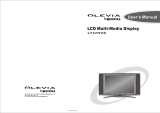Page is loading ...

チューナー フレーム
1
Table of Contents
Features
2
System Requirements 2
Package Contents
3
Part Identification 4
Remote Controller 5
Installation 6
FCC Notice 8

2
Features
This TV Tuner Frame is designed for
· Picture frame style which allows a 3”x5” portrait
photograph
· NTSC, PAL, or SECAM television system supported
· 125 channels of UHF/VHF and CATV for NTSC system
· Stereo audio output and adjustable volume control
· Auto-scan channel setup
· On Screen Display control function
· Infrared remote control
· MTS audio output (for NTSC system only)
System Requirements
· LCD monitor or other display device with video input
capability
· TV antenna or cable TV signal input
· Speakers with build-in amplifier
· DC +9V power input
3
Package Contents
· TV Tuner Frame x 1
· Remote controller x 1
· Video cable x 1
· Audio cable x 1
· Power adapter x 1
· User manual x 1
· Batteries AAA size x 2 (for remote controller)

4
Parts Identification
Front view
1. Remote control receiver window
2. Picture frame
Back view
· DC 9V IN (for power input)
· ANT INPUT (for antenna signal input)
· VIDEO OUTPUT (for video signal output)
· AUDIO OUTPUT (for audio signal output)
DC 9V IN
VIDEO
ANT
INPUT OUTPUT
AUDIO
OUTPUT
This device complies with Part 15 of the FCC
Rules.Operation is subject to the following two
conditions:(1)this de vice may not cause harmful
interference,and(2)this dev ice must accept any
interference received,inc luding interference that
may cause undesired operation.
MADE IN TAIWAN.
MODEL NO.: TV-01
XXXXXXXX
0XX00001
Associated Industries China, Inc.
S/N:FTB
檢磁
9V/500mAInput:
Gruppe
TUV Rheinland
TYPE
BAUART
GEPR UFT
APPROVED
Ly
5
Remote controller
1 0…9, 100: for direct channel selection
2 CH▲▼: channel selection
3 VOL▲▼: volume control
4 RETURN: return to last selected channel
5 CH +/-: to add or erase channel
6 TV/CATV: select TV or cable TV
7 MUTE: to enable/disable the audio mute function
8 MTS: to select audio mode (mono/stereo/sap)
(This function is only feasible for NTSC system.)
9 SCAN: to scan the available channels and to memorize
automatically
10 RECALL: to show current status
11 TV/PC: to switch between TV and PC screens (This function
may not be feasible if you are not using an AG neovo monitor.)

6
Installation
1 Installation of TV tuner function
1.1 Plug the TV antenna or cable TV connection to the “ANT
INPUT” on the rear of the TV Tuner Frame.
1.2 Connect the “VIDEO OUTPUT” port on the rear of the TV
Tuner Frame to the “VIDEO INPUT” port of LCD monitor
by using the video cable included.
1.3 Connect the “AUDIO OUTPUT” port on the rear of the TV
Tuner Frame to the “AUDIO INPUT” of speaker by using
the audio cable included.
1.4 Plug power connection of power adapter into the “DC 9V
IN” port on the rear of the TV Tuner Frame.
2 Installation of remote controller
2.1 Remove the battery cover on the rear of remote controller.
2.2 Insert the batteries included into the slot. Be sure the
direction of battery’s pole is correct.
2.3 Attach the cover back to the remote controller.
3 Setup of TV channels
3.1 Turn on the LCD monitor connected to the TV Tuner
Frame.
3.2 Press the SCAN button on the remote controller to scan all
the available channels automatically.
4 Installation of photograph to the frame
4.1 Remove the photograph inside the frame already. You
may need to shake the TV Tuner Frame up and down.
4.2 The frame is designed for photographs up to 5” by 3” (12.7
by 7.6 cm) size. You may need to refine the size of your
photograph to fit into the frame.
7
4.3 Insert the photograph and be sure it is positioned properly.
The photograph should not cover the remote control receiver
window. Otherwise, the remote controller will be no function.

8
FCC NOTICE
This device complies with Part 15 of the FCC Rules. Operation is
subject to the following two
conditions :
(1) this device may not cause harmful interface, and
(2) this device must accept any interference received, including
interference that may cause undesired operation.
/





